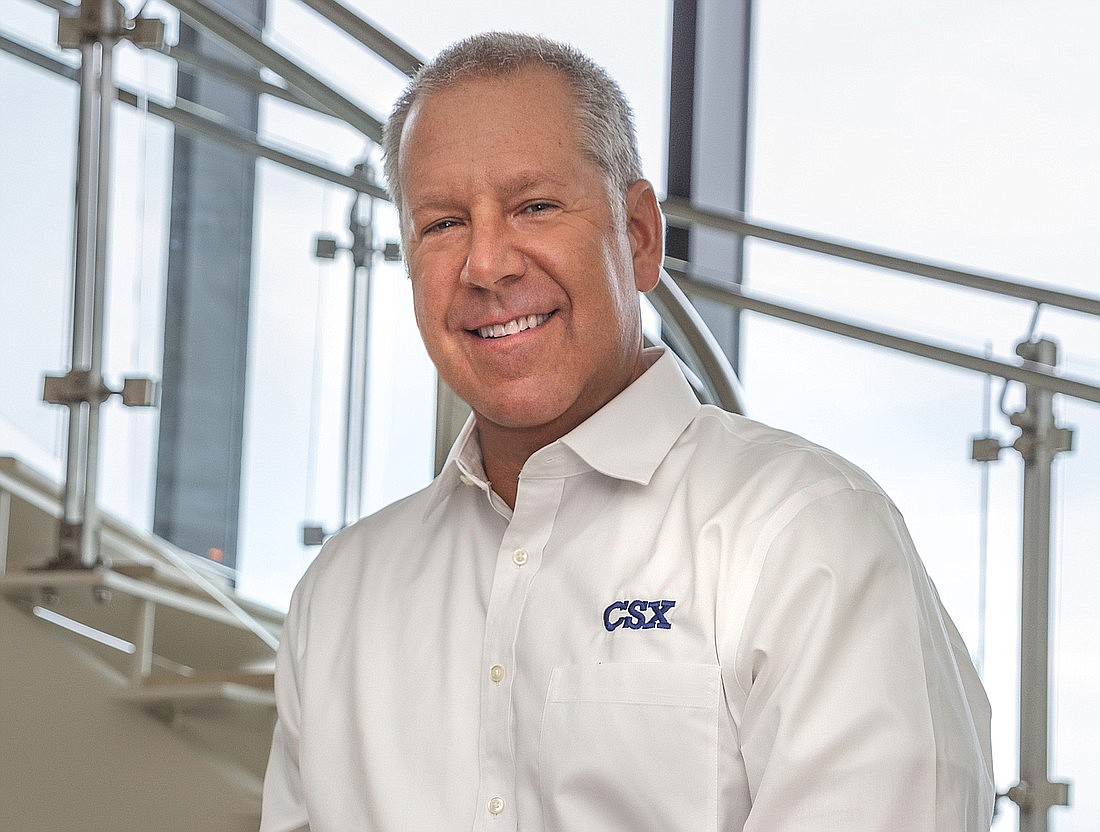
The U.S. outlook for 2023 is uncertain, with economists predicting a possible recession or at best a year of minimal growth.
However, CSX Corp. Chief Executive Officer Joe Hinrichs said the railroad’s business will outperform the nation’s gross domestic product, the broadest measurement of the overall economy.
Hinrichs points to the Jacksonville-based company’s improved service performance and increased staffing as reasons for optimism.
“Over the last couple of years, we haven’t had the capacity” to handle customers’ freight demand, Hinrichs said in a Jan. 26 interview after CSX’s year-end earnings report.
“We’re now at the staffing level we were targeting,” he said.
“Service levels and operating performance are substantially better than what it was six months ago.”
CSX’s freight volumes declined slightly last year but fourth-quarter revenue rose 9% to $3.73 billion, helped in part by fuel surcharges to offset rising costs and pricing gains.
For all of 2022, revenue rose 19% to $14.9 billion.
CSX’s fourth-quarter earnings rose by 7 cents a share to 49 cents and full-year earnings rose by 27 cents to $1.95 a share.
But the key number in the company’s earnings report was its 7,067 train and engine employees, reaching a target level CSX has been trying to attain for the last two years after the coronavirus pandemic.
CSX’s total employment was 22,542 at the end of 2022.
Hinrichs is confident CSX will be able to maintain full staffing levels on its trains and increase employment in its rail network, which covers most of the Eastern U.S.
“We have another 600 already out there being trained,” he said. “We are targeting to get to around 7,300.”
Having more employees than needed will help the company in the summer months when vacations impact the availability of workers.
Hinrichs joined CSX in September, succeeding Jim Foote as CEO. But he saw that the company was having difficulty with service in the summer of 2022.
“Manpower shortages were more pronounced in the summer,” he said.
Hinrichs said the railroad industry’s service problems are similar to those of airlines, when staffing issues can result in the cancellation of flights. It creates logistical problems that make it difficult to get the network back to normal.
“Everything has to work nicely to make everything work well,” he said.
As CSX’s network increased staff in the fourth quarter, it reported big improvements in average train speed and dwell (time rail cars sit idle in the train yards) from the third quarter. Its “carload trip plan performance” (cars arriving on or ahead of schedule) improved by 20 percentage points to 77% in the fourth quarter.
“Now we’re in a situation where we have nice flow, we have nice fluidity to our network,” Hinrichs said.
Hinrichs, a longtime executive with Ford Motor Co., said he hasn’t found any big surprises in his first four months on the job at CSX.
“I’m very encouraged by the talent and the character of the people here,” he said.
He thinks relationships are improving with employees. The railroad industry needed federal legislation in December to settle negotiations with national labor unions.
Hinrichs, who had a reputation of successfully working with the United Auto Workers union while at Ford, said CSX is still working to settle issues with local unions.
“I feel good about the relationships,” he said.
“We have more work to do but I feel good about the progress that we’re making.”
He said the improvement in operations at CSX will help the relationships with employees.
“With our network running better, the work-life balance will be better for our employees,” he said.
As CEO of one of Jacksonville’s four Fortune 500 companies, Hinrichs also recognizes the importance of the company’s role in the local community.
Hinrichs said he’s been meeting with community leaders and is joining the Jacksonville Civic Council. He expects the company to become more involved with local issues.
“We’ve been talking about, as a leadership team, what additional areas do we want to be involved in?” he said.